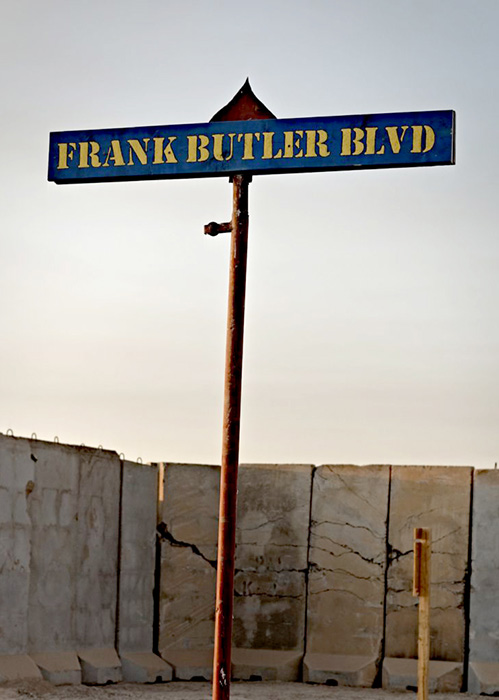Road on U.S. Base in Iraq Honors Navy SEAL Doc

Need directions to the Forward Surgical Team facility at the Logistical Support Area just south of Mosul, Iraq? It's easy to find. It's on the corner of the base runway flight line and Frank Butler Blvd. The road was named in November 2016 to honor retired Navy Capt. (Dr.) Frank K. Butler, Jr.
Butler started his career as a Navy SEAL officer, went on to become an Undersea Medical Officer and then an eye surgeon. He retired as the command surgeon of the U.S. Special Operations Command in 2006.
"This was a complete surprise," said Butler, chairman of the Committee on Tactical Combat Casualty Care and chief of prehospital trauma care at the U.S. Army Institute of Surgical Research Joint Trauma System. "Navy Capt. Tom Craig, a deployed emergency medicine physician, e-mailed me from Iraq and told me about it."
Craig, a physician serving at a medical facility in Mosul, led the effort to name the road at the LSA after Butler as a result of Butler's 20 years devoted to developing and improving Tactical Combat Casualty Care. TCCC is a set of evidence-based, best-practice prehospital trauma care guidelines customized for use on the battlefield. TCCC has become the standard throughout the Department of Defense and in allied militaries for battlefield trauma care and has been credited with saving thousands of lives in combat in Iraq and Afghanistan.
Butler's involvement in developing TCCC began in 1996 when he co-authored a manuscript that was published in a supplement to the peer-reviewed medical journal Military Medicine. The document, titled "Tactical Combat Casualty Care in Special Operations," presented the results of a four-year research effort that reviewed the evidence base for every aspect of battlefield trauma care as it was practiced in the U.S. military in 1992 and proposed sweeping changes in this care.
"That 1996 article did as much as any other single piece of medical literature to nudge the military medical community forward in modernizing combat casualty care," explained Frumentarius (a pseudonym for a former SEAL/CIA case officer) in a story published on the website sofrep.com in December 2016. "Frank Butler's contributions to TCCC have continued unabated over the course of the 20 years since the publication of the 1996 paper."
Having a road named to honor him means a great deal to Butler, "Because it happened as a spontaneous 'thank you' for TCCC from the Navy docs and Corpsmen at our Role II in Iraq, and they are the ones out there using TCCC to save lives downrange," he said.
"Also, and very importantly, this is a strong endorsement for the work done by the Committee on TCCC and the TCCC Working Group over the last 15 years to improve battlefield trauma care," added Butler. "Many advances in combat casualty care achieved by the military in wars past have been lost during the ensuing peace interval. After seeing the dramatic reduction in preventable deaths that TCCC has helped to achieve, the U.S. military has to ensure that we sustain this success so that it will benefit our country's combat wounded in the future. Our country's men and women in uniform count on military medicine to provide them with the best care possible if they are wounded in combat – and we must live up to that trust every day."
 An official website of the United States government
An official website of the United States government
 ) or https:// means you've safely connected to the .mil website. Share sensitive information only on official, secure websites.
) or https:// means you've safely connected to the .mil website. Share sensitive information only on official, secure websites.


